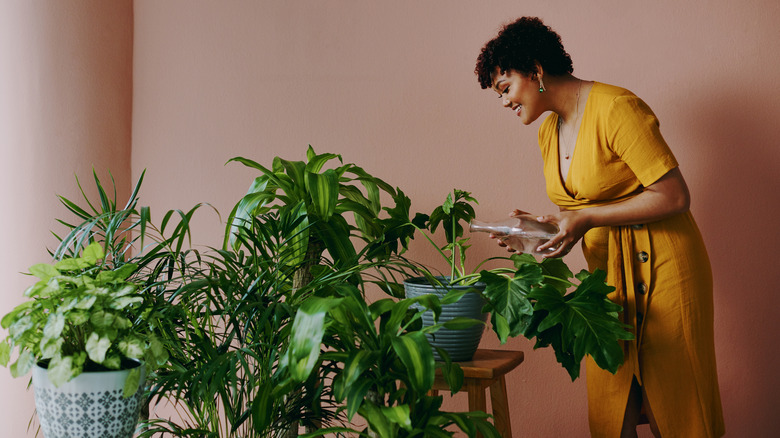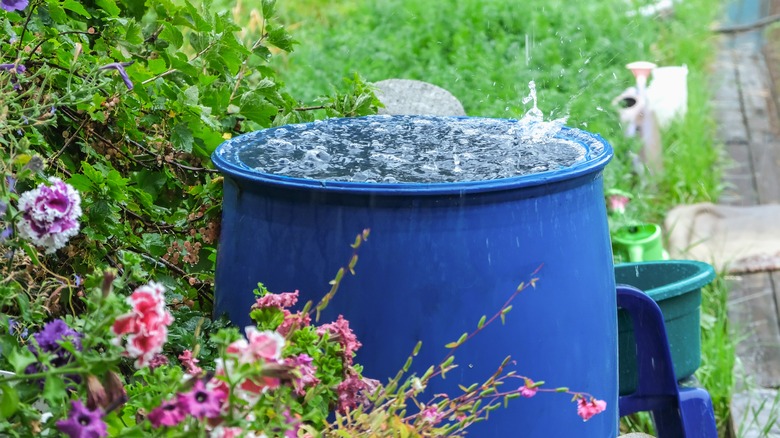Rain Water Vs. Distilled Water: Which Is Best For Watering Your Plants?
Houseplants are a great addition to any home because they add a sense of beauty and tranquility to your space and may even be beneficial for your mental health. However, some houseplants can be tricky to care for and may not thrive even if you give them plenty of water and care. If you are doing everything right and your plants are still struggling, then you may want to take a look at the water you are using. As it turns out, certain types of water (especially tap water) contain chemicals that are harmful to plants. While tap water is still okay for most plants, for certain sensitive species, many gardeners turn to either rain water or distilled water — but which type of water is better for your plants?
Both distilled water and rain water are great for sensitive plants that don't do well with tap water; however, rain water is the slightly better option. While rain water is more of a pain to collect and store, the problem with distilled water is that all the minerals and nutrients have been removed and this may stunt the growth of your plants in the long run.
Why plants love rain water
The majority of plants, while outside in their natural environment, receive their water from rain. So, it makes sense that rain water is particularly good for many houseplants because they have evolved to rely on it. Because of this, most plants will grow taller and stronger when watered with rain water when compared to many other sources. The main reason for this is that rain water doesn't contain harmful chemicals like tap water, but still has the minerals and nutrients that are missing in distilled water. But how does rain water contain minerals and nutrients if it is collected without ever touching the ground?
As it turns out, rain water starts its cycle pure (with no minerals or nutrients) while held as moisture inside a cloud. However, the major change happens as the rain is formed and falls through the atmosphere where it picks up important minerals including nitrogen, sulfur, phosphorus, calcium, and magnesium. Plus, on top of containing these beneficial nutrients, rain water that is collected in containers on your property will contain organic materials like dead leaves, pollen, and microorganisms that can act almost like a fertilizer for your indoor plants.
However, the issue with rain is that it is inconsistent and can be difficult to collect if you live in a drought-stricken area. It also requires large containers for collection and storage. Luckily, if you are unable to access rain water, it is also possible to use distilled water.
How to use distilled water to make your plants thrive
While not as naturally good as rain water, distilled water is relatively cheap and easy to find in your local grocery store. Plus, while it's not the number one best water for plants, it can still help your plants thrive if used in the right way. Because distilled water is pure water with no added chemicals, your tap-water-sensitive plants will benefit from being watered with it. However, because distilled water doesn't have the added nutrients that rain water and tap water contain, your plants may become nutrient-deficient and not grow as healthy and strong as they otherwise would have.
To solve this problem, you will need to add some type of fertilizer to your houseplants. As one Redditor on the plants forum of the website explained, when using distilled water, "you will have to add a little fertilizer to the water every third or fourth watering," and while this may be a good idea for your houseplants in general, it is necessary for those watered with distilled water. However, it is important to know that houseplants are more likely to suffer from mineral build-up than outdoor plants, so it is essential not to over-fertilize them. Around ¼ to ½ teaspoon of fertilizer for every gallon of distilled water should do the trick.


